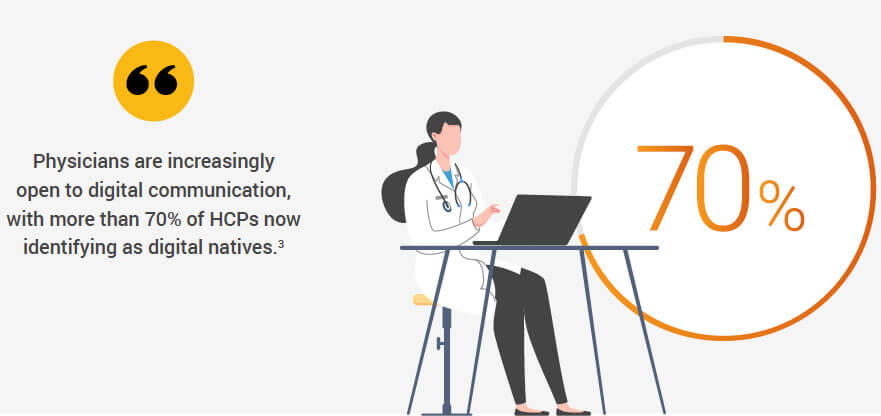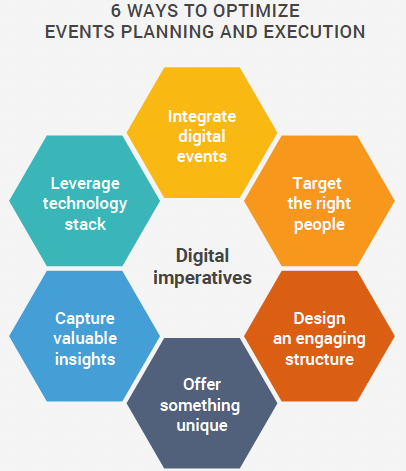Article
How to Realize Value From Digital Events
THOUGHT STARTER SERIES
The events landscape in life sciences changed dramatically during COVID-19, a point highlighted by recent data that notes 800,000 fewer interactions from field-based events in the U.S., a 75% reduction in pharma-sponsored events during the months immediately following onset of the pandemic, and a significant uplift in online events.1
While a return to in-person events has already been seen as we enter the post-pandemic phase, that doesn’t mean digital events will be completely out of the picture. With more than 70% of HCPs now digital natives,2 customers and companies are increasingly showing a preference for deeper digital penetration and hybrid events. With a digital-first approach to events, life sciences marketers can ultimately operate with greater agency and expectations in a more competitive events market.

An opportunity for a fresh approach

For many pharma companies, this shift can seem daunting, especially when so much rides on large annual events and local dinners to get key product information and clinical data to HCPs. But it doesn’t have to be.
Digital events provide a unique opportunity for a refresh of your events strategy, and they generate value beyond in-person events by delivering educational content and patient insights all year long. In today’s world, the winning formula is more likely to be smaller, recurring events where bite-sized chunks of content are delivered more frequently, and information is shared in formats optimized for peer-to-peer collaboration.
Potential benefits companies can expect to see from digital events include:
- Greater reach
Borderless interactions and lower logistical burden help drive a broader stakeholder group and better attendance—a point enhanced when events are made shorter or on-demand, allowing people to more easily fit them into their schedules. -
Personalized interaction
Digital removes a one-size-fits-all approach and makes it easier to capture and tailor content to HCP preferences through personalized journeys. -
Improved insights
Digital engagement enables better customer activity tracking, allowing for a deeper understanding of their preferences and interests. -
Better ROI and efficiency
Large in-person events are costly. Digital removes a lot of this cost, which means budgets can stretch a lot further for potentially higher impact.
"Having a digitally focused events strategy provides the flexibility to reach HCPs in the format that fits their preferences, whether live or virtual, at the time they are looking for information. This approach gives pharma the ability to deliver more personalized experiences and reach previously untapped audiences." – Kimberly Berger, GM, Veeva Digital Events
How to get there
As the event landscape evolves, now is the time to make the most of digital events by optimizing the way they’re planned and executed. Here are six steps to delivering an effective event strategy:
- Integrate digital events into your broader omnichannel
strategy
Historically, events were siloed and were rarely integrated into customer journeys; however, in the future they should be closely integrated and coordinated across different teams to offer a seamless experience across the various channels used to interact with customers. Companies should have a clear and coordinated strategy for driving attendance, while providing enhanced post-event interaction to continue the dialoguec - Target the right people
To get the most efficient return on your investment, the participants and presenters should be carefully selected to ensure they meet company objectives and customer needs. This can be done in multiple ways, such as engaging therapy-area thoughts leaders (e.g., using Veeva Link to help identify who those digital opinion leaders are). Having a clear value proposition for these attendees is critical. Previous insights into event attendance and content preferences can help articulate the “what’s in it for me?” - Design an engaging structure
A phrase often heard over the past year is “screen fatigue,” when the monotony of Zoom calls causes participants to stop engaging, or even worse, stop attending in the first place. While this can be a barrier, we’re seeing HCPs engaging much longer through remote/virtual channels— proof that when the content is appropriate, HCPs will listen. Digital events should be appropriately structured and personalized to ensure the experience is interesting and relevant. Consider including previews and teasers of different sessions, a variety of session formats, and opportunities for interactivity and social sharing. - Offer something unique
Content is the foundation of any interaction, but an event needs to add something different to bring the content to life. HCPs can go to the internet to get information— companies need to carefully think through what else the HCP will get by attending. The ability to interact with colleagues, hear from a particular key opinion leader (KOL), or get a first glimpse at new data are often compelling propositions. - Capture valuable insight
HCPs are not a homogenous block with the same personalities and preferences. Realizing this, organizations are increasingly shifting towards personalized engagement strategies; however, this relies on effective insight capture. Companies can build their understanding of HCP perception and preferences by capturing qualitative insights, or through more advanced means, such as content tagging, polling, or post-event surveys. Insights should then be analyzed, disseminated, and fed back into the broader strategy to allow personalized future engagements. - Leverage the right technology stack
Underlining this new agile approach must be a technology stack that is simple, integrated, flexible, and compliant. At the most fundamental level, the system should be easily usable and scalable to allow variable event sizing, easy log-in, and customer use. The most effective solutions will allow data integration from multiple internal and external sources to provide a single customer view. This integration will enable sales and marketing to derive actionable insights and inform their downstream tactical approach to customer engagement.

Embracing a digital future
While the market has shifted to digital and hybrid events, it doesn’t have to mean lower engagement. On the contrary, it is an opportunity to refresh your event strategy to drive even richer engagement through regular, differentiated, and memorable events.
The greater scalability and quality of interactions make digital events a strategic necessity. Companies that get it right will benefit through deeper insights, better customer experiences, and ultimately, an improvement in event outcomes, brand perception, and product advocacy.
Key takeaways

Digital or hybrid events are gaining traction because they provide an opportunity for better reach, improved customer satisfaction, enhanced insight generation, and more efficient ROI.
Feedback collection and insights generation are at the heart of successful events, not just pre-, during, and post-event, but as part of a continuous process to personalize all aspects of the customer journey.
Underlying any successful digital or hybrid event should be a flexible, integrated technology stack for providing a next-level customer experience.
Fowey Harvey
Business Consultant
fowey.harvey@veeva.com
About Veeva Business Consulting
Veeva Business Consulting combines commercial and medical expertise with Veeva’s proprietary data and technology to deliver better business focused solutions for our customers. Our team of experts offers a suite of advisory offerings, including launch readiness, digital acceleration, and content optimization, all supported through unique HCP insights and analytics.
To learn more, visit veeva.com/eu/business-consulting.
2, 3 “Intelligent HCP Engagement in Europe,” Veeva and Across Health, 2020.
